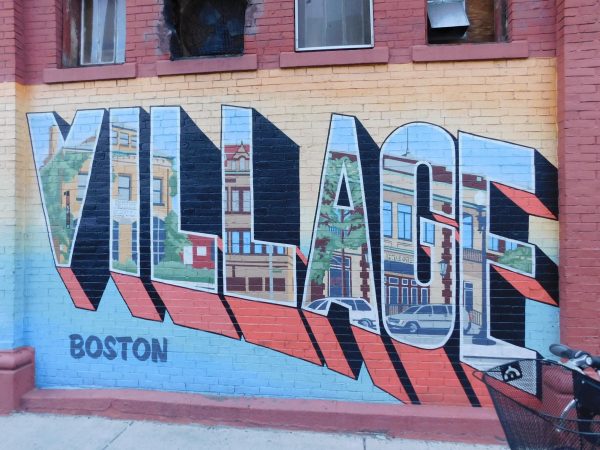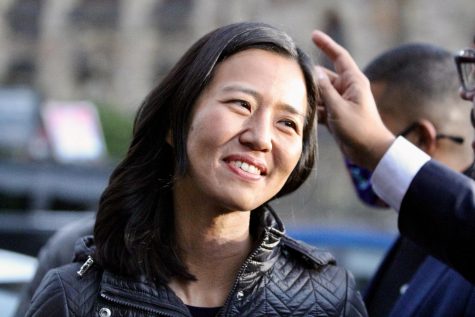As gig economy booms, accountability is harder to pinpoint
Raheem McCoy was a gifted basketball player in the process of finishing his bachelor’s degree in business management at the University of Massachusetts Boston. When he was struck and killed by an Uber driver in 2018, the tragedy of his death brought forth questions of safety and accountability.
Following the 26-year-old’s death, his mother, Janice Flemon McCoy, had to navigate the loopholes connected to corporate giant Uber amid the grief and loss of her son. It’s been over a year since the incident and the question remains unanswered: Who is accountable for this tragedy?
According to public records filed Sept. 20, 2019, in Suffolk County Superior Court, McCoy is suing driver John Williams of Revere as well as Uber Technologies, Inc. and Raiser, LLC, a wholly owned subsidiary of Uber, on counts of wrongful death and multiple damages. While Uber is the brand, San Francisco-based Raiser handles all of the contracts, linking drivers through the app interface with riders.
Referenced in court documents, Williams was driving for Uber at approximately 6:20 p.m. on Oct. 10, 2018, with a passenger on board “negligently, unlawfully and carelessly on a public roadway in Boston, Massachusetts, causing said motor vehicle to collide with and fatally injure the plaintiff’s decedent, Raheem McCoy.”
Although Janice Flemon McCoy and her attorney Mindy Kingsman declined to comment for this story, public documents state McCoy was driving a motorcycle in accordance with traffic laws. Cosmetic damage to Williams’ car meant it did not meet the requirements for operating on Uber’s platform. McCoy is demanding a trial by jury to cover damages and legal fees.
“He will be remembered for his ability to touch people’s hearts, his sense of humor and his loyalty beyond comprehension as he would always have your back,” reads Raheem McCoy’s Go Fund Me page organized by his mother. “His enthusiasm for family and people leaves a void.”
Janice Flemon McCoy is not the only individual left to wonder whether proper oversight by app-based platforms could have prevented a tragedy. The rapid growth of the gig economy has led to lapses in vetting and accountability has become less apparent. Traditionally, employers actively address issues and, when necessary, tragedy. But under the new rules of the gig economy, it is unclear where responsibility lies.
“With the gig economy, the social safety net is being pulled apart more rapidly than I think at any other point in time,” explains Craig Peters, a partner at San Francisco-based Altair Law and expert in cases involving injury or death. “If you separate the corporation from the worker by instituting this fiction that they are an independent contractor, they do not have to worry about vetting anymore, because they are not going to get sued.”
One case, many players
Raiser, LLC’s invovlement in the McCoy case complicates the situation. According to court documents, Williams “entered into a Technology Services Agreement with Raiser, LLC,” not Uber Technologies, Inc.
Uber is defined in court documents as strictly “a technology company that, among other things, develops applications for road transportation, navigation and ride sharing.”
Sara Peters, of no relation to Craig Peters, is a lead trial lawyer for severely injured individuals specializing in cases with Uber and Lyft, and a lecturer at Stanford Law School. She explains the role of Raiser, LLC and the implications of this corporate shell for drivers and riders alike.
“[Raiser’s] main role is that they interface with the drivers,” explains Peters. “That is the employer of the drivers. It’s Raiser, not Uber. As they frame it, Uber is a tech company that creates an app that interfaces with the riders. Raiser does the contract with any policies with respect to the driver side of things, so there is a driver-facing entity and a rider-facing entity.”
Wall of silence
Accountability is contingent on not only clarity, but also on the presence of robust channels for communication. A decentralized model, maximized for efficiency and profit, means it is harder to reach representatives at these platforms, Uber being no exception. Understanding who is involved but then finding it almost impossible to speak with a real person, breeds an atmosphere of diminished oversight and clouded liability.
Carly DeBeikes, safety communications representative for Uber, refused to comment on the distinction between the two companies due to ongoing litigation.
Multiple attempts were also made to reach Uber via phone, but all phone numbers were out of service. Sara Peters believes that barriers to communication with the company are intentional.
“It is hard to get ahold of people at Uber – I believe that’s by design,” says Peters. “I think it’s a safety issue when somebody needs to report, for example, an assault by a driver who’s about to go out and interact with more riders and needs to be stopped immediately, and the person who’s been injured can’t get ahold of anybody to let them know.”
A product manager based at Uber’s global headquarters in San Francisco, whose identity has been protected for fear of retaliation from Uber, says, “Sometimes when riders will write into the app, there’s like automated responses … Obviously you can’t automate everything. I think that we’re doing a good job, probably not the best job though.”
“I guess I’m not surprised that it was hard for you to find a way to just call in,” they add.
Rapid growth without oversight, a problem for wider gig economy
Jim Spletzer, a principal economist at the U.S. Census Bureau Center for Economic Studies in Washington D.C. notes that the gig economy is growing unlike any other sector because of the changing technology landscape – especially with regard to transportation services. With the growth of the gig economy, technological advancement is intrinsically tied to heightened efficiency, consolidated risk mitigation and ultimately diminished oversight.
“The fact that there are millions of non-employers earning self-employment income in the ground transportation services right now when there was roughly only 100 thousand doing it 12 years ago, that shows you how quick technology can impact a given industry,” says Spletzer. And that meteoric growth means that operational structures may not have had adequate time to scale up.
Uber is not the only platform on which tragedies occur due to negligence or lack of proper vetting in the gig economy.
Airbnb recently changed its oversight policies after an article published last year by Vice exposed large-scale property scams operating through the service. But the company’s attempts to increase accountability did not come soon enough for 32-year-old Zak Stone who suffered the loss of a loved-one in part because of the company’s negligence.
When a dead branch, upon which hung a swing, went unreported at an Airbnb property in 2013, 62-year-old Louis Stone paid the ultimate price as the branch came crashing down on top of him. Now his son has been grappling with the consequences of this disaster for almost a decade – one that he argues could have been prevented, had proper care been taken by Airbnb.
“I do think that my father’s death could have been prevented with just a little bit more oversight,” explains Stone, a journalist living in New York. “That property was obviously visually unsafe, and it could’ve and should’ve just been taken down.”
Stone notes how the company is dedicated to the visual presentation of listings to maximize bookings. He argues that aside from caring about the property’s appearance, a safety inspection could have easily been mandated.
According to a company-wide email sent by CEO Brian Chesky on Nov. 6, Airbnb is now pledging to institute a number of measures to ensure the safety of guests and the accuracy of listings on the platform including a “24/7 Neighbor Hotline” that would allow individuals to reach a real, non-automated representative at any time as well as the extension of manual property listing screenings. While this is a positive shift, it is long overdue, rolling out nearly seven years after the death of Stone’s father and countless other tragedies.
Even if the accident could not have been prevented had the proper oversight and vetting been exercised by Airbnb, the response following the incident offered little help.
“I got an email a little while later from some Trust and Safety person at Airbnb,” says Stone, but her background in law enforcement, which he discovered after searching online, gave him pause. “I was just like, I don’t feel this is a conversation that would be in my interest to have. It seems like it’s in their interest to get information from me,” he explains.
Stone walked away feeling as though his communication with Airbnb offered no accountability or constructive problem-solving following his tragedy.
After multiple attempts by email, Airbnb could not be reached for this story.
Protections for workers
The problem is two-fold: On the one hand, there is the safety and satisfaction of customers, while on the other is the rights and protections of workers.
Williams of the McCoy case could not be reached for comment after repeated attempts to contact him by phone. But as he is sued for damages alongside corporate entities Uber Technologies, Inc. and Raiser, LLC, it is hard to decipher what protections he has as an individual operating under Uber’s platform at the time of the incident.
In the gig economy, the outsourcing of risk is often marketed as flexibility and this can leave both customers and workers vulnerable.
Alexandrea J. Ravenelle, an assistant professor of sociology at the University of North Carolina, Chapel Hill, and author of the 2019 book “Hustle and Gig: Struggling and Surviving in the Sharing Economy,” describes the vulnerability of many workers in the gig economy.
“Instead of making their workers employees,” Ravenelle explains of technology platforms like Uber and Grubhub, “they call them independent contractors and they are outside these workplace protections.” When workers are defined as independent contractors, protections take the backseat. But most importantly, companies are not held accountable, leaving workers or properties underinsured and victims ultimately without justice.
Craig Peters, explains the wider implications for individuals ruled at fault in a gig economy case.
“When it comes to the gig economy, the double whammy is these companies [are] acting as separate and apart from the actual workers in the corporation, therefore insulating themselves from lawsuits,” he explains. The result being, “that person is under-insured and therefore can’t compensate the person fully and fairly for the injuries that they have caused on behalf of the corporations.”
The result, hypothesizes Peters, is that if Uber ultimately asserts that only Williams is liable in the McCoy case, the plaintiff will not be compensated fully and fairly for the loss of her son.
Solutions
States like California have been applauded for their legislative efforts to enforce worker protections under acts like AB5, which limits the ability of corporations to classify employees as independent contractors. In California, individuals working for platforms like Uber are employees and are protected with the same rights in a court of law.
Ravenelle says that unless worker protections are standardized in the gig economy, more industries will be replaced by lower-cost gig models that benefit the bottom lines of corporations and forsake the basic rights of the workforce. And this shift will mean fewer protections for workers and less accountability on the consumer side.
With proper worker protections and networks of accountability, cases like the McCoy case and that of Stone would have clear-cut channels for oversight, vetting and ultimately, reparations.
As the McCoy family continues to navigate the obstacles presented by corporate giant Uber and subsidiary Rasier LLC., they have not let the absence of justice or accountability slow them from honoring their son and the members of his community. Organizing a scholarship fund in his name, the Raheem O. McCoy #50 Scholarship on GoFundMe, Janice McCoy has set out to mobilize students graduating from her son’s alma mater, the Boston Community Leadership Academy.
“Raheem’s family wishes to make it possible for those who did not know him to benefit from his goodness,” the page reads. “The Scholarships will go toward books, living expenses etc., and any other needs or obstacles for [student] success.”







